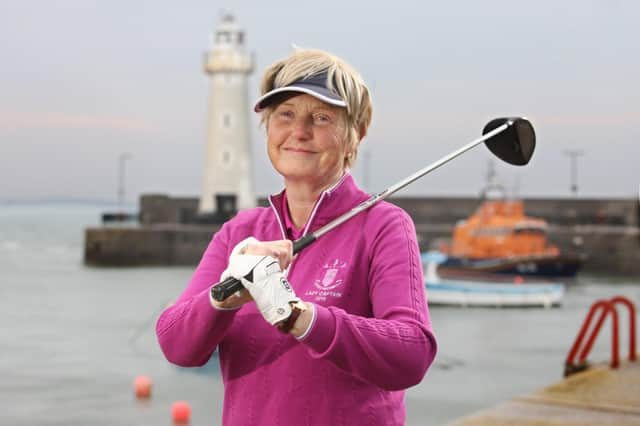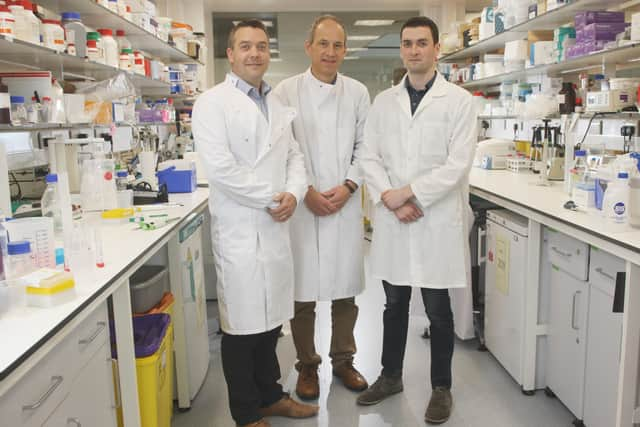Co Down woman Valerie McIlveen on collapsing on the golf course with genetic condition which causes a ‘baggy’ heart


As Valerie McIlveen prepared to tee off for a game of golf one sunny morning in 2006, she had no idea her life was about to change.
The Co Down woman collapsed on the course at Donaghadee Golf Club leading to a six-week hospital stay and a life-altering cardiac diagnosis.
Advertisement
Hide AdAdvertisement
Hide AdValerie (62) was told she had dilated cardiomyopathy (DCM) a condition in which the heart muscle becomes thinned and weakened so it becomes ‘baggy’ and is unable to pump blood around the body efficiently.


She said until that day on the picturesque golf course when she suddenly felt unwell, she considered herself a normal healthy 46-year-old.
“Up until the day I collapsed I thought of myself as relatively fit and well. I had a pacemaker fitted in 2000 after routine surgery but I had never had any trouble,” she said.
“I can remember I had played four holes when I suddenly felt really short of breath and unwell and just fell to the ground.
Advertisement
Hide AdAdvertisement
Hide Ad“I was taken to hospital by ambulance and while in hospital they discovered the dilated cardiomyopathy. I then had a procedure to have an ICD fitted.”
Life-saving device
An ICD (implantable cardioverter defibrillator) is a small device which can treat people with dangerously abnormal heart rhythms.
It sends electrical pulses to regulate abnormal heart rhythms, especially those that could be dangerous and cause a cardiac arrest.
Unfortunately, it will not cure the cardiomyopathy but helps prevent Valerie’s heart stopping.
“This little device helps keep me alive,” said Valerie.
Advertisement
Hide AdAdvertisement
Hide Ad“Even today I will never underestimate the power of this little matchbox-sized device and the amazing science behind it.”
The former gold lady captain is a keen fundraiser for British Heart Foundation Northern Ireland (BHF NI) and is supporting the charity’s new campaign ‘This is Science’, which is calling for the public’s support to power science that could lead to new treatments and cures for all heart and circulatory diseases
Valerie had never heard of DCM before her diagnosis. The condition is estimated to affect up to 7,600 (up to one in 250) people in Northern Ireland.
Inherited DCM can be caused by a change or mutation in one or more genes. More commonly, DCM is caused by other conditions, such as heart valve problems, uncontrolled high blood pressure or viral infections. It is believed Valerie’s was caused by an infection.
Advertisement
Hide AdAdvertisement
Hide Ad“I think after I was diagnosed, I was gobsmacked. I had bever heard of this before but suddenly I had to make changes and I think then that was the hardest part.”
With the support of her husband Martin and her wider family Valerie began to move on.
“At first your family want to wrap you cotton wool and I can understand why. It was scary. I wasn’t allowed to drive for a while, you are told not to do things like swimming alone and it can really affect your independence. But slowly you rebuild your confidence.”
More heart scares
A decade later in 2016, Valerie and Martin were on holiday in Lanzarote when the alarm in the ICD began to sound.
Advertisement
Hide AdAdvertisement
Hide Ad“It was the oddest sensation hearing this alarm coming from your chest and I knew I needed to seek help immediately. It was really very scary.”
It was discovered one of the wires in the ICD had broken and after a stay in hospital on the Canary Island, Valerie was flown home for the issue to be fixed via surgery.
Three years later, while at a relative’s funeral Valerie had another scare.
“I had just got back into the car with my husband and sister when I suddenly blacked out.
Advertisement
Hide AdAdvertisement
Hide Ad“I have no memory of this at all, but my husband and sister saw me literally jerk as the defibrillator kicked in and shocked me. I imagine that was an incredibly frightening experience for them.
“But it is the amazing the power of science that kept me alive that day.”
Research into DCM
BHF NI is funding research into DCM at Queen’s University. Scientists at the Wellcome-Wolfson Institute for Experimental Medicine have been studying data from thousands of individual heart cells from people with DCM.
PhD student Oisín Cappa, Dr Chris Watson and Dr David Simpson have discovered changes in these heart cells. This work is the first stage in research that could eventually lead to new treatments for DCM.
Advertisement
Hide AdAdvertisement
Hide Ad“This early research will guide further studies to improve diagnosis of patients with DCM or even development of treatments for the condition,” said Oisín Cappa.
“There are currently no targeted treatments that are specific for DCM, but as we get a better understanding of the genes involved in the condition, we can start to develop new treatments which target these genes.
“We want our research to play a part in helping people like Valerie.”
Valerie attends regular reviews with her cardiologist and although testing has shown her heart has become more enlarged, she remains positive.
Advertisement
Hide AdAdvertisement
Hide Ad“I have had fantastic care from the team at the City Hospital and Ulster Hospital and I really can’t thank them enough I feel incredibly well looked after.
“At a recent appointment I was told my heart had got bigger and there may be a chance I might need a heart transplant in the future.
“But I remain positive. I still love golf and although I feel much more tired than I used to be, I should still be able to play nine holes rather than the full 18 holes.
“I like to get out for a walk and try to lead as normal a life as I can. You have to get on and live your life.
Advertisement
Hide AdAdvertisement
Hide Ad“That is why I am supporting BHF NI’s new campaign. I want to keep funding the amazing scientific research that is helping me and people like me across Northern Ireland.”
Head of BHF NI Fearghal McKinney said: “Valerie is living proof of the power of BHF research and how amazing scientific advances are heling people righty across Northern Ireland. And Oisín Cappa’s research at Queen’s University is just one of the many examples of the research we are funding into inherited heart conditions.
“With the public’s help, we are determined to do all we can to save and improve lives. Donations from local people will power the science to help find the breakthroughs, treatments and cures of the future.
“For more than 60 years, public support has helped the BHF turn research that once seemed like ‘science fiction’ into reality and we need your help now more than ever.”
Advertisement
Hide AdAdvertisement
Hide AdTo find out more about the BHF’s campaign, visit https://www.bhf.org.uk/this-is-science
A message from the Editor:
Thank you for reading this story on our website. While I have your attention, I also have an important request to make of you.
With the coronavirus lockdowns having had a major impact on many of our advertisers — and consequently the revenue we receive — we are more reliant than ever on you taking out a digital subscription.
Subscribe to newsletter.co.uk and enjoy unlimited access to the best Northern Ireland and UK news and information online and on our app. With a digital subscription, you can read more than 5 articles, see fewer ads, enjoy faster load times, and get access to exclusive newsletters and content.
Visit
https://www.newsletter.co.uk/subscriptionsnow to sign up.
Advertisement
Hide AdAdvertisement
Hide AdOur journalism costs money and we rely on advertising, print and digital revenues to help to support them. By supporting us, we are able to support you in providing trusted, fact-checked content for this website.
Ben Lowry, Editor
Comment Guidelines
National World encourages reader discussion on our stories. User feedback, insights and back-and-forth exchanges add a rich layer of context to reporting. Please review our Community Guidelines before commenting.